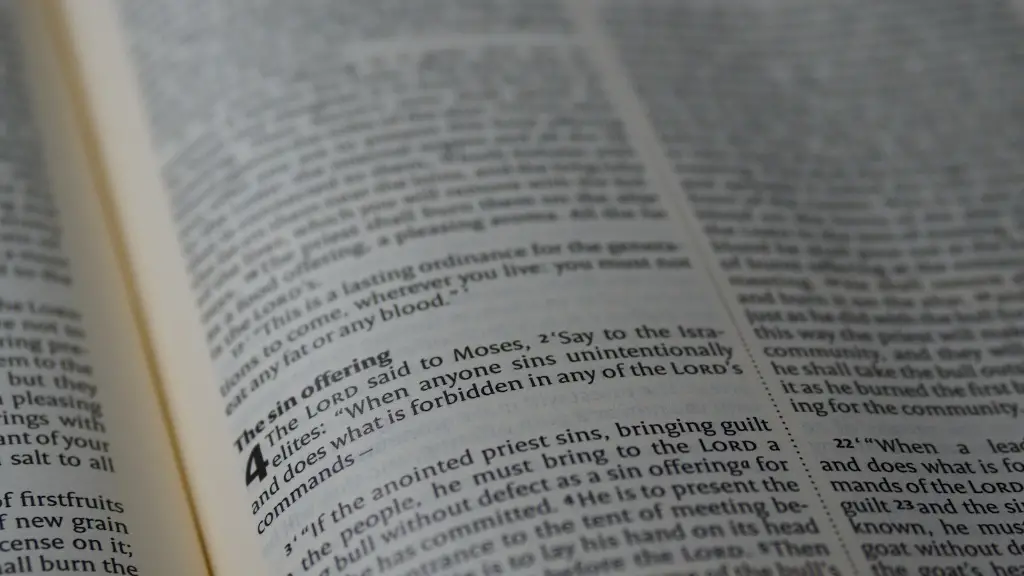What Does Charity Mean In The Bible?
Charity is a concept mentioned numerous times in the Bible, both in the Old and New Testament, although often under different terminology. It is a much deeper concept than merely giving money to those in need and reaching out to help those less fortunate. Charity is defined by Christian theologians as “love in action”, and throughout the bible, it is presented as one of the essential ingredients of a life filled with grace and mercy.
When Jesus came to proclaim the Word of God and the Kingdom of Heaven, He spoke of charity as the central theme of being a Christian. He said “By this shall everyone know that you are my disciples, if you have love one another” and “A new commandment I give to you, love one another.” He made charity synonymous with justice and love.
Charity is a multi-faceted concept. The bible presents charity as an act of love and kindness towards others, a display of mercy, compassion, and kindness. It is often associated with the idea of neighborliness. In the book of Proverbs it says “Share your bread with the hungry, and take the poor and homeless into your house. When you see the naked, clothe them.” Another passage from the gospel of Luke states “Your neighbor is anyone in need of help.”
The Bible also mentions charity in terms of righteousness, emphasizing that it is not just about helping others in need, but about developing relationships and demonstrating kindness and justice to all people. Jesus said “Give to those who ask of you, do not turn away from anyone in need” and “In everything, do to others what you would have them do to you; for this is the law and the prophets.”
The Bible also speaks of charity in terms of charity towards God. Jesus said “And whatever you do, in word or deed, do everything in the name of the Lord Jesus, giving thanks to God the Father through him” and “Give, and it will be given unto you; good measure, pressed down, shaken together, and running over will be put into your bosom. For with the same measure that you use, it will be measured back to you.” These passages speak of how charity towards God can bring blessings in return.
Charity as a Source of Strength
The bible says that charity is a source of strength. In the book of Micah it says “He has shown you, O man, what is good; and what does the Lord require of you but to do justly, to love mercy, and to walk humbly with your God” and “Blessed is he who considers the poor; the Lord will deliver him in the time of trouble.” These passages demonstrate that God rewards those who are generous and kind, and that charity can give us strength in difficult moments.
The Bible also shows charity as an act of faith. In the book of James it says “Show me your faith without your works, and I will show you my faith by my works” and “Pure and undefiled religion before God and the Father is this: to visit orphans and widows in their trouble.” Showing God we believe in Him can be done through charity and by helping those less fortunate, we can demonstrate that our faith is real.
The concept of charity is also connected with other Christian virtues such as hospitality and generosity. The Bible says “Be kind to one another, tenderhearted, forgiving each other, just as God, in Christ, has forgiven you” and “Do not neglect to show hospitality to strangers, for thereby some have entertained angels unawares.” By living out these virtues, we can be a reflection of God’s love and mercy to those around us.
Although we are called to give to those less fortunate, the Bible does not promote a philosophy of charity at all costs, and tells us to be wise about these decisions. In the book of Proverbs it says “Do not rob the poor because they are poor, and do not crush the afflicted at the gate” and “If you give to the needy, do not let your left hand know what your right hand is doing.”
Model of Charity
The Bible presents Jesus as the ultimate model of charity and grace. Jesus said “No one has greater love than this, to lay down one’s life for one’s friends” and “You have heard that it was said, ‘Love your neighbor, and hate your enemy’ but I say to you, love your enemies and bless those who curse you.” As we strive to emulate his example, we are called to show kindness to everyone, and not just those closest to us.
The Bible also gives us examples of individuals in the Bible who lived a life of charity and exemplified the virtue of charity. The Bible mentions Rahab, a prostitute who offered shelter and assistance to the spies of Joshua; Ruth, who chose to follow and serve her mother-in-law Naomi; and Zaccheus, who gave half of his wealth away after meeting Jesus.
St. Paul’s letters to the early church addressed various aspects of charity. He wrote “I desire then that in all things God may be glorified through Jesus Christ, to whom all glory and power belong. As you excel in everything, in faith, utterance, knowledge, love, and every kind of service, put it into practice with excellence and success.” This passage encourages us to put our faith into action and show charity to others through our actions.
Fruit of Charity
The Bible speaks of charity as being a “fruit of the Spirit” (Galatians 5:22) and a “gift of God” (2 Corinthians 9:15). This indicates that when we show charity to others, it is an expression of the Holy Spirit working within us. The Bible also mentions that charity brings fruit in eternity, saying “Blessed are those whose merciful deeds are remembered forever” (Psalms 112:6).
The Bible also speaks of charity in terms of justice, saying “He has shown you, O man, what is good; and what does the Lord require of you but to do justice, to love mercy, and to walk humbly with your God?” (Micah 6:8) and “Righteousness and justice are the foundation of Your throne” (Psalm 89:14). Charity is not simply a random act of kindness, but part of a larger mission to achieve justice and uphold the rights of the oppressed.
The Bible also tells us that charity is based on faith. In Hebrews 11:6 it says “But without faith it is impossible to please God, for he who comes to God must believe that he is, and that he is a rewarder of those who diligently seek Him.” This passage suggests that it is faith in God that motivates us to show charity, that it is out of faith that we extend care and kindness towards others.
Charity in Modern Times
In modern times, charity has taken on a new meaning. In the developed world, it is most often associated with giving money or goods to charitable organizations that support disadvantaged individuals and communities. This can help alleviate poverty, shame and hunger, and gives those who may not be able to care for themselves a chance at a better life.
Charity is also increasingly recognized as a form of social responsibility. Many businesses and organizations now recognize their role in contributing to the well-being of their communities and strive to make a positive impact in their local area or wider world.
Charity is also an important part of many religious practices. Many faith communities believe that charity is a responsibility and a reflection of their beliefs and values. They often encourage all members to give in some way to organizations, causes, or individuals in need.
Overall, charity remains an important concept in modern society. It is an expression of human kindness and decency, of giving to those in need, and reflects our sense of responsibility to our fellow citizens. Above all, charity is an expression of our love and care for one another.
Charity as a Human Right
The idea of charity as a human right is becoming increasingly prominent in global discussions and debates. When a person cannot satisfy their basic needs, due to a lack of means or other factors, they should not be overlooked or treated as an afterthought. Every person has the right to a life of dignity, safety, and satisfaction.
The concept of “a right to charity” is based on the principle of human rights, notably the right to food, clothing, and shelter. Therefore, when a person is unable to secure these for themselves, for whatever reason, it is the collective responsibility of both the state and the public to ensure their rights are respected.
The idea of charity as a human right is closely linked to other concepts like social justice, humanitarianism, and universal obligations. These principles recognize the shared responsibility of reflection of our collective obligation to care for the most vulnerable in society. As the idea of charity as a human right spreads and is recognized, it is possible that the most disadvantaged members of society will receive the care and support they need.
Conclusion of Charity
Charity is a concept that has been promoted by religious, humanitarian, and political leaders throughout the centuries. It has a long history and remains an important quality as we strive to build a just and equitable society. Charity compels us to look outward and to recognize the value of each and every person. Charity is at once a motivation and an obligation, and is rooted in our commitment to love our neighbors as ourselves, to demonstrate mercy and kindness to all, particularly those who cannot help themselves, and to build a more equitable world for all.





